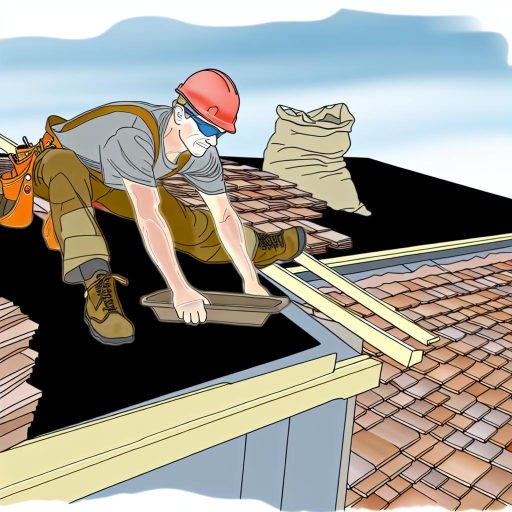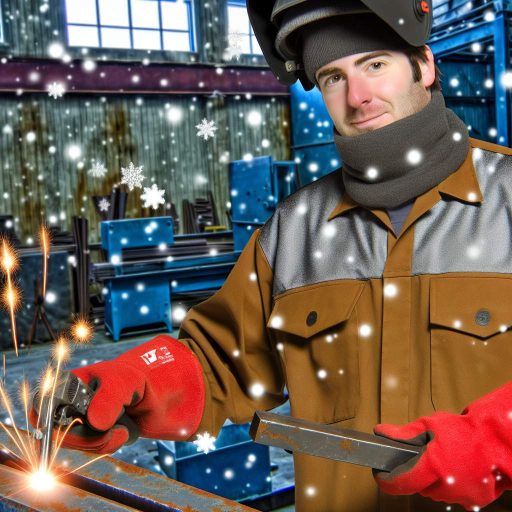Understanding the Role of an Ironworker in Canada
Overview of Ironworking
An ironworker constructs and erects steel structures.
This role is vital in various construction projects.
Ironworkers often work on buildings, bridges, and roads.
They handle raw materials like iron and steel effectively.
Moreover, they join and install heavy metal components.
Key Responsibilities
Ironworkers primarily read and interpret blueprints.
They use these plans to understand project specifications.
Additionally, they prepare and help in setting up the site.
Ironworkers regularly operate lifting equipment and cranes.
They ensure all work complies with safety regulations.
Skills Required
Strong physical fitness is crucial for an ironworker.
They must possess good hand-eye coordination.
Additionally, analytical skills help in solving problems on-site.
Effective communication is key to working in teams.
Finally, having knowledge of welding and metalworking processes is essential.
Work Environment
Ironworkers typically work outdoors in various weather conditions.
The job often involves working at heights or in cramped spaces.
They must adhere to strict safety protocols to prevent accidents.
Teamwork plays a significant role in daily operations.
Ironworkers may work long hours, especially in peak seasons.
Understand the Different Types of Ironworking
Structural Ironworking
Structural ironworking focuses on building frameworks for structures.
This type includes steel beams, columns, and trusses.
Ironworkers use heavy machinery to hoist materials into place.
Additionally, they ensure that each component meets safety standards.
Structural ironworkers must interpret blueprints accurately.
Unlock Your Career Potential
Visualize a clear path to success with our tailored Career Consulting service. Personalized insights in just 1-3 days.
Get StartedThis requires strong attention to detail and spatial awareness.
Reinforcing Ironworking
Reinforcing ironworking is essential for concrete structures.
This type involves placing rebar to strengthen concrete.
Ironworkers must bend and tie rebar according to specifications.
Moreover, they often work in challenging environments.
Steel reinforcement increases the durability of structures.
Ornamental Ironworking
Ornamental ironworking emphasizes both form and function.
This type includes decorative railings, gates, and staircases.
Ironworkers in this field must possess artistic skills.
Furthermore, they must weld and fabricate intricate designs.
Ornamental pieces enhance the aesthetic appeal of buildings.
Educational Requirements for Aspiring Ironworkers
High School Diploma
To become an ironworker, you first need a high school diploma.
This qualification lays the foundation for your future education.
During high school, focus on subjects like mathematics and physics.
These subjects enhance your problem-solving skills and technical understanding.
Additionally, participating in shop classes can provide practical skills.
Construction-Related Courses
Furthering your education with construction-related courses is beneficial.
Many community colleges offer programs tailored for aspiring ironworkers.
These courses often cover topics such as blueprint reading and welding techniques.
Gaining knowledge in construction safety is also crucial for your career.
Consider enrolling in apprenticeships that provide hands-on training.
Benefits of Further Education
Education increases your employability in the ironworking field.
It equips you with essential skills and knowledge sought by employers.
Moreover, advanced training can lead to better job positions.
Continuing education offers insights into industry trends and technologies.
As a result, being educated helps you stay competitive in the job market.
You Might Also Like: Understanding the Art and Craft of Upholstery
Finding Apprenticeship Programs and Unions for Ironworkers in Canada
Understand the Ironworker Craft
Ironworking requires specific skills and training.
Understanding the craft is vital before seeking employment.
This knowledge will guide you in choosing the right program.
Explore Local Union Opportunities
Start by researching local ironworker unions in your region.
Unions often provide valuable resources for apprenticeships.
Consider contacting unions like the Ironworkers’ Union Local 720.
They can offer insights on available training programs.
Research Apprenticeship Programs
Look for registered apprenticeship programs in your area.
These programs combine on-the-job training with classroom instruction.
One noteworthy program is the Ontario College of Trades.
They provide training tailored to the ironworking field.
Requirements for Apprenticeship
Meet the minimum age requirement, typically 16 years old.
Complete basic education, often a high school diploma.
Some programs may require a pre-apprenticeship course.
These courses enhance your skills and employability.
Network Within the Industry
Join industry-related events and workshops.
Networking can lead to more apprenticeship opportunities.
Attend job fairs specifically for tradespeople.
Connect with established ironworkers for advice and mentorship.
Consider Financial Assistance
Investigate potential scholarships and financial aid options.
Many unions offer funds to support training expenses.
Check for government programs that support trades training.
Such support can ease the financial burden during your training.
Stay Committed to Your Training
Once enrolled, remain dedicated to your apprenticeship.
Consistent effort will enhance your skills significantly.
Engage actively in both practical and theoretical components.
This commitment will pave the way to your ironworking career.
Delve into the Subject: Exploring the Artistry in Bricklaying Designs
Complete the Necessary Training and Obtain a Red Seal Certification
Importance of Training
Training is essential for aspiring ironworkers in Canada.
It ensures safety and skill development on the job site.
Additionally, proper training helps improve job readiness.
Choosing the Right Program
Select a recognized ironworking apprenticeship program.
Research various institutions that offer such training.
For instance, programs at North American Trade Schools are highly regarded.
Hands-On Learning Experience
Participate in hands-on training opportunities during your apprenticeship.
This helps you gain real-world experience in ironworking.
Moreover, you will learn valuable techniques and safety protocols.
Obtaining Red Seal Certification
The Red Seal certification is a nationally recognized credential.
It demonstrates your skills and knowledge in ironworking.
Ensure you meet the requirements set by the Red Seal program.
Exam Preparation
Study thoroughly for the Red Seal exam.
Utilize study materials and practice exams for effective preparation.
Additionally, join study groups with fellow apprentices.
Career Advancement Opportunities
Having Red Seal certification opens up numerous job opportunities.
Employers often prefer candidates with this qualification.
Furthermore, it can lead to higher wages and positions of responsibility.
Explore Further: Effective Communication Tips for Bricklayers
Gain Practical Experience Through On-the-Job Training and Mentorship
Understanding On-the-Job Training
On-the-job training provides essential hands-on experience.
This type of training occurs in real work environments.
It allows you to learn and apply new skills immediately.
The Importance of Mentorship
A mentor guides you through your ironworking journey.
Having a mentor can enhance your learning experience.
They offer valuable insights and advice based on experience.
Finding a Suitable Mentor
Start by looking within your network for potential mentors.
Consider connecting with seasoned ironworkers you admire.
Local ironworking unions often have mentorship programs available.
Committing to Ongoing Learning
Always be open to learning from every experience.
Ask questions and seek clarification on complex tasks.
Continuous learning ensures you stay updated in your field.
Building a Strong Work Ethic
A strong work ethic is critical for success as an ironworker.
Dedicate yourself to completing tasks efficiently and effectively.
Prioritize safety and quality in every job you undertake.
Networking and Building Relationships
Networking is essential in the construction industry.
Build relationships with colleagues and industry professionals.
Attend workshops, seminars, and trade shows to expand your connections.
Discover More: Exploring the Demand for Bricklayers in Canada

Familiarize Yourself with Health and Safety Standards
Understanding the Importance
Health and safety standards protect workers on construction sites.
These regulations ensure a safe working environment for ironworkers.
Additionally, compliance helps avoid legal consequences for companies.
Research Applicable Standards
Begin by reviewing federal and provincial regulations.
For example, in Canada, the Occupational Health and Safety Act is crucial.
This act outlines general duties for employers and employees.
Furthermore, specific standards may vary by province.
Attend Training Programs
Participating in formal training enhances your understanding.
Many organizations offer courses focused on safety procedures.
For instance, the Canadian Construction Association provides valuable resources.
Additionally, completing first-aid and CPR training is beneficial.
Implement Safety Practices
Incorporate safety practices into your daily routine.
Always wear personal protective equipment, such as helmets and gloves.
Moreover, maintain a clean and organized worksite to prevent accidents.
Regularly inspect tools and equipment to ensure they are in safe working order.
Stay Informed
Keep up with changes in health and safety legislation.
Join professional organizations that provide updates and training.
Networking with other professionals also enhances your knowledge.
Ultimately, continuous education contributes to your success as an ironworker.
Developing Physical Fitness and Skills for Ironwork
Understanding the Physical Demands
Ironworkers must maintain a high level of physical fitness.
They frequently lift heavy materials and work in challenging environments.
This job requires strength, stamina, and flexibility.
Building Strength and Endurance
A regular strength training program is essential for ironworkers.
Focus on exercises that target core muscles, legs, and back.
Additionally, incorporate cardiovascular workouts into your routine.
Running, cycling, or swimming enhances overall endurance.
Improving Balance and Coordination
Ironworking involves working at heights and handling materials carefully.
Participate in activities that improve your balance and coordination.
Yoga and martial arts can help develop these skills effectively.
Gaining Technical Skills
Becoming proficient in ironworking requires technical knowledge.
Seek out relevant training programs or apprenticeships.
Learn how to read blueprints and use various tools.
Understanding welding, cutting, and reinforcing techniques is crucial.
Obtaining Certification
Acquiring the necessary certifications enhances your employability.
Certifications may include safety training and equipment operation.
Research local regulations and industry requirements in Canada.
Prioritizing Safety Awareness
Safety is the top priority in ironworking.
Stay updated on safety protocols and practices.
Participate in workshops focused on occupational safety.
Wear appropriate personal protective equipment on the job.
Networking and Continuous Education
Importance of Networking
Networking plays a crucial role in your ironworking career.
It helps you connect with experienced professionals in the field.
Additionally, networking opens doors to potential job opportunities.
Attending industry events can enhance your visibility among peers.
For example, conferences allow you to meet leading experts.
How to Network Effectively
Utilize social media platforms for professional connections.
Join organizations such as the Ironworkers Union.
Participate in local workshops and training sessions.
Don’t hesitate to ask for informational interviews with seasoned ironworkers.
Share your experiences and insights in relevant forums.
Engaging in Continuous Education
Continuous education enhances your skills and knowledge base.
Consider enrolling in courses related to advanced ironworking techniques.
Certifications can significantly boost your resume.
Stay updated by attending seminars on industry innovations.
Check out online resources for additional learning materials.
Benefits of Ongoing Learning
Ongoing education helps you adapt to changing technologies.
It improves your efficiency and productivity on the job site.
Moreover, it can lead to higher wages and career advancement.
Professionals with certifications tend to have better job security.
Engaging with peers in classes can broaden your professional network.
Additional Resources
Temporary Foreign Workers in Alberta’s Certified Trades …
How does a Canadian welder/ironworker find a job on an American …




